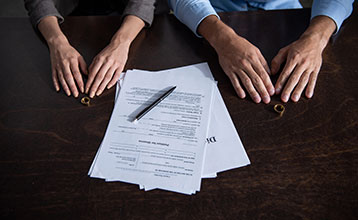Expatriate divorce in Singapore
With a large community of foreigners and expatriates in Singapore, it is natural to expect the divorce rate among foreigners to rise here. If you are looking for an expatriate divorce lawyer in Singapore, here are answers to some pressing questions you may have that will help you understand your situation better:
1. Can I get a divorce in Singapore if I did not get married here?
Yes, you can file for divorce in Singapore even if you are not a Permanent Resident and even if you are not working here provided that you and your spouse:
- have been married for three years;
- have lived in Singapore for the past 3 years, OR
- are ‘domiciled’ in Singapore (i.e., intend to make Singapore your permanent home).
2. Should I get a divorce in Singapore or my home country?
We have come across many foreigners and expats who – after comparing the convenience, expense and justice systems of Singapore and their home country – choose Singapore as the place to get their divorce. Some of the reasons why foreigners choose Singapore as the place to divorce are below.
If your children and assets are in Singapore, then Singapore may be the more logical jurisdiction to commence your divorce.
In terms of the efficiency of the justice system, Singapore is hard to beat. The Singapore legal system, like much of Singapore, operates efficiently. If the divorce is uncontested, you can complete the divorce proceedings within 4 months (and you do not even need to go to court). If your divorce is contested, the case should take about 1 year to complete. There are no delays to divorce cases as the court keeps a very tight control to ensure that cases are not prolonged.
In terms of the law, Singapore strives to be fair to both men and women. There is a misconception that women have a better deal because the legislation governing marriage and divorce is called the ‘Women’s Charter.’ This is an erroneous impression because the Singapore courts have constantly stated and given judgments that reflect the Singapore legal position that both parties to a marriage are ‘equal partners. Both monetary and non-monetary contributions towards the marriage are equally important.
Singapore does not operate on a ‘fault’ basis in decisions involving children custody, asset division, and maintenance. This is to say, the Singapore court generally does not penalise the party at ‘fault’ for the break up in the marriage.
The Singapore courts are extremely proactive in mediation. The court process compels parties to attend court mediation to try to resolve cases.
3. What can I do if my spouse has taken our child out of Singapore?
Singapore is a signatory to The Hague Convention on the Civil Aspects of International Child Abduction 1980. Countries that are signatories to The Hague Convention are under an obligation to return your child to Singapore.
If your spouse brings your child to a country not a signatory to The Hague Convention, it will be challenging to bring your child back.
If you have reason to believe that your spouse will take your child out of Singapore, you should consult a divorce lawyer immediately, who may advise you to apply for an injunction order. This order empowers agencies such as the Immigration and Checkpoints Authority (ICA) to stop a parent who has been prohibited by a court order from taking the child out of the country from leaving Singapore. Those who defy court orders will be caught by the authorities at the checkpoints.
In divorce proceedings, the bottom line is to be mindful of your child’s whereabouts to prevent unnecessary complications.
4. What can I do to prevent my spouse from leaving Singapore with my child during divorce proceedings?
If there is a possibility of your spouse leaving Singapore with your child, you may wish to apply for interim care and control of your child so that the opportunities for your spouse to take your child away will be lessened. You may also apply to be the parent to have possession of your child’s passport. There are also plans to have the immigration authorities stop a child from leaving the country if there is a court order that prevents your spouse from bringing your child out of Singapore.
5. If I am the dependent spouse, do I have to leave Singapore immediately after the divorce?
If you are in Singapore as a dependent (i.e., you hold a Dependent’s Pass), you must leave the country once the divorce is finalized, as you are no longer deemed to be dependent on your husband. A practical option would be to begin job-searching once divorce proceedings have begun so that you may remain in Singapore in your own right with an employment pass.
6. My spouse and I have a prenuptial agreement made outside Singapore. Can I enforce that agreement in Singapore?
Singapore courts will take the prenuptial agreement into account when assessing the case. It retains the right to follow or not follow the terms in the prenuptial agreement. It is simply one factor that the court looks at to arrive at a just and fair decision.
Fixed, clear & transparent fees
$1,490
No children, property or maintenance
$2,490
With children, property and maintenance


